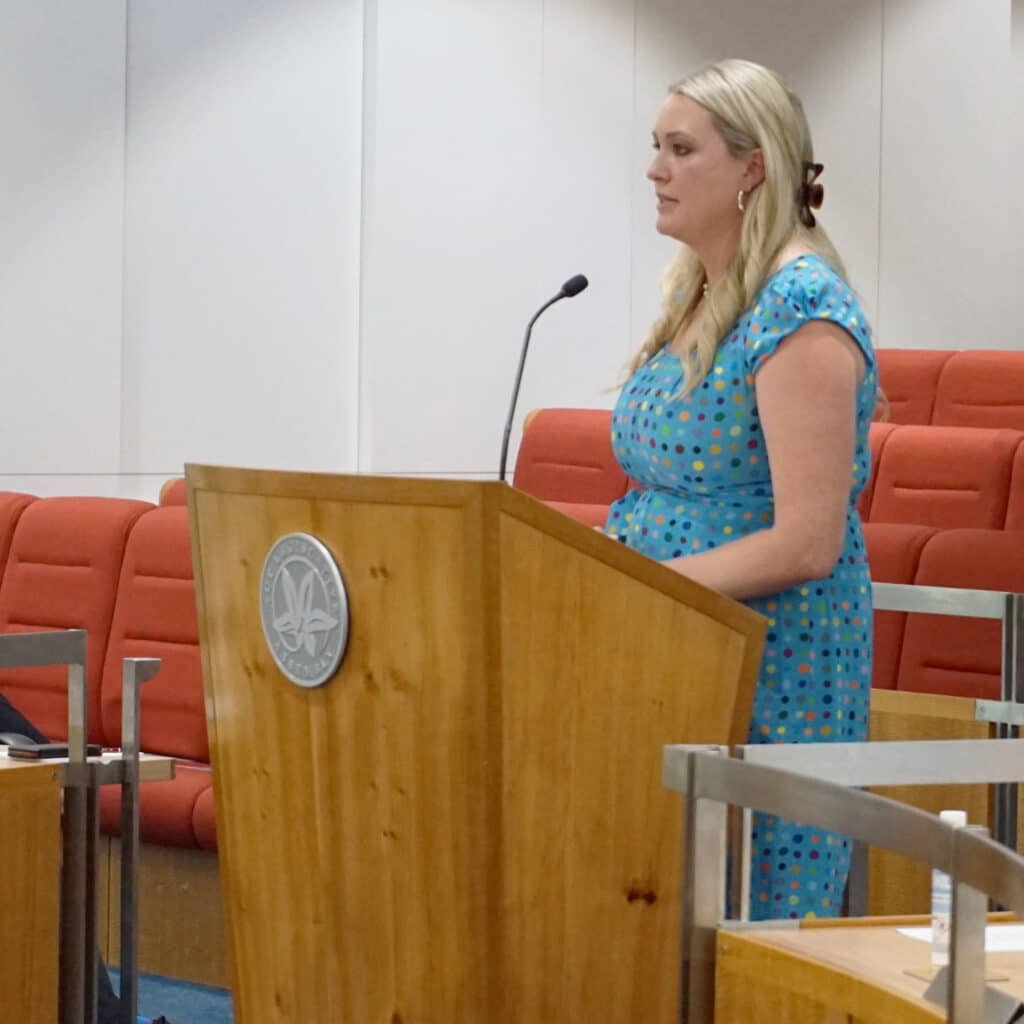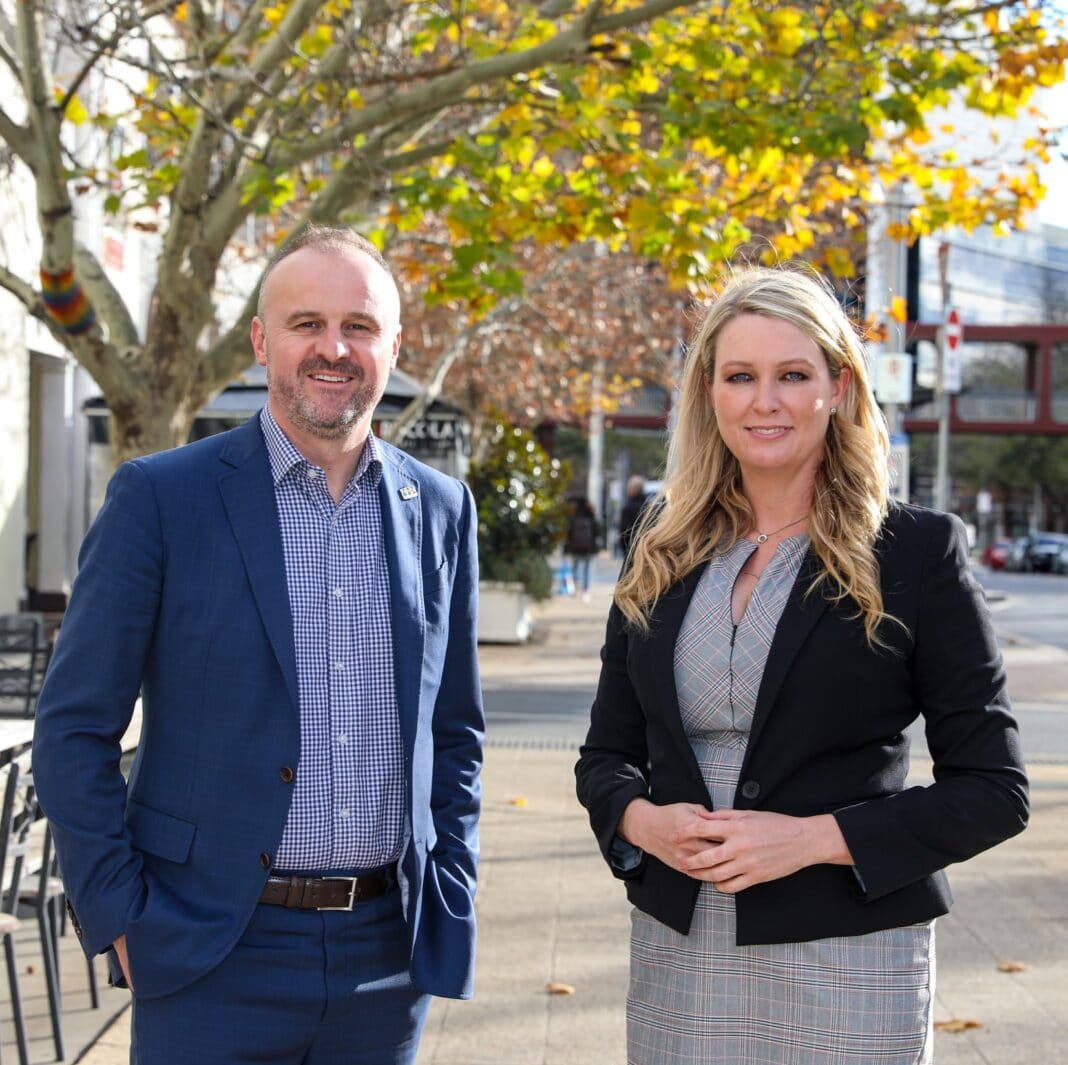In her first speech, Dr Marisa Paterson, the ACT’s only new Labor MLA, spoke passionately last week about racism, gambling, and sexual harassment.
Dr Paterson, anthropologist, academic, and director of the Centre for Gambling Research, joined the Labor Party two years ago.
“An important part of my work as a researcher has always been to remain independent. I was at a point where I felt maintaining independence was compromising action and advocacy. It no longer worked for me,” she said.
“Joining the party has been a remarkable experience. It’s been a great relief for me to be surrounded by people with similar world views and values, all working together to make the world a fair and equitable place.”
Indigenous issues
A drive to make Australia a better place led to the young Marisa Paterson studying psychology and anthropology at Monash; a Master of Applied Anthropology at ANU focused on mental health and addiction research; and a PhD scholarship at Charles Darwin University studying the impact of gambling on remote Aboriginal communities.

Dr Paterson was in Maningrida, Arnhem Land, when the Northern Territory Emergency Response (“the Intervention”) took place in 2007, following allegations of child abuse in Aboriginal communities.
The Racial Discrimination Act 1975 was suspended, and emergency powers were put in place: “A raft of measures and controls that directly impacted each and every one of the 2,000 people living in the community,” Dr Paterson said.
“No one, including me, understood what was happening and why; the fear, misunderstanding, misinformation in the community was palpable. The fear that the government was coming to take their children again.”
Dr Paterson described how politicians, bureaucrats, lawyers and doctors arrived; army trucks were deployed from Darwin; police set up checkpoints; the townships were compulsorily acquired; government business managers sent in; health checks were conducted; and incomes were quarantined.
“This was Australia in 2007,” Dr Paterson said. “I witnessed firsthand what it actually looks like when government has unprecedented powers, and powers directed to target a specific racial group. This was a pivotal moment in my life. It enshrined in me an understanding of the systemic level of racism and ongoing colonisation of Aboriginal and Torres Strait Islander people in this country.
“As I now move into politics, I do so very consciously with the recognition of the true power and impact both intended and unintended that government policy has on people and their lives. I take the gravity of this position as a member of the Legislative Assembly very seriously.”
Gambling
After finishing her PhD at ANU, Dr Paterson eventually became director of the University’s Centre for Gambling Research. For the last 15 years, she said, she has conducted research with thousands of people harmed by gambling, and the community services that support them.
A tenth of the Canberra adult population were affected by gambling, Dr Paterson said, while one in five males under the age of 45 was likely to be an at-risk or problem gambler.
As an MLA, Dr Paterson said she would be able to speak for her constituents affected by gambling. She remembered the despair of a woman whose husband lost their home, the powerlessness of a child, the helplessness of a man whose elderly mother was at the club each day.
Poker machines were “the dark heart of our clubs”, Dr Paterson said. “These machines directly contradict the narrative that clubs are a positive contributor to our community.”
Clubs had more to offer than pokies, she said; they provided important jobs, sporting infrastructure, and supported community and local sporting groups.
“I challenge the club sector in the ACT to reframe their businesses, to be the driver of reform, to be proactive in addressing harm, and be progressive in having women on their boards and as their senior staff.”
Sexual harassment
Four days before she was nominated as a Labor candidate, in August 2019, Dr Paterson submitted a formal complaint that a prominent New Zealand academic – Professor Max Abbott, formerly of the Auckland University of Technology – had sexually harassed and stalked her for two years.
The complaint process failed her, Dr Paterson said: “Despite hundreds of pages of texts and emails evidencing what had happened, there was no investigation into what had happened, and no disciplinary action was taken. This man continued to hold a position of power over my career. And now that I had made a formal complaint against him, that felt even more threatening. I had no protection and no justice.”
A media investigation by the New Zealand media organisation Stuff this year “unravelled a decades-long culture of sexual harassment and cover-ups”, Dr Paterson said. Professor Abbott and senior staff and executives have resigned; one of New Zealand’s leading QCs is conducting an external independent review into sexual harassment; and a coalition of New Zealand academics is demanding an independent national body be established to address sexual harassment.
“Ultimately, what is played out in my situation is the normal in a lot of workplaces – including our Federal Parliament,” Dr Paterson said. “Men in powerful positions will ultimately work to protect each other, regardless of the cost to other people, and ultimately the enormous reputational cost to their institutions and organisations.
“Sexual harassment is an abuse of power, a corruption of power, and it is largely gender-based. My personal wellbeing, my mental health, and my career should not suffer because I won’t engage with someone sexually.”
Marisa Paterson said she had chosen to tell her story because it demonstrated to the community what type of leader she would be.
“It has taken me 37 years to learn to stand up for myself. I can do that now, which means I can confidently say to the people of Murrumbidgee and of Canberra I can stand up for you; I can fight for you.
“I will fight very publicly at times, and I will do the long hard yards, the hard conversations and the small steps that are needed at other times. From the streetlight that stopped working to the shopping centre upgrade to systemic structural cultural change that is required in our society, I will walk with you every step of the way.”
More in this series:



